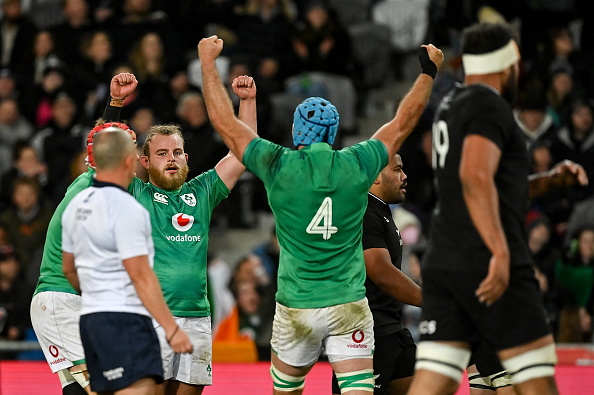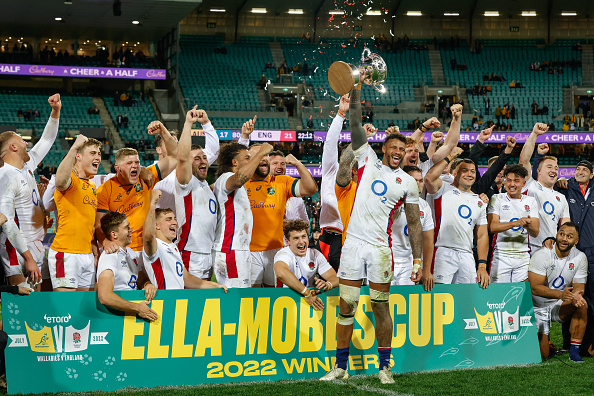When appraising any World Rugby ranking rise, an observer can think specifically on ‘how it affects the right now?’, or whether peaking later is the right trajectory? Then realizing there is a full year out until France 2023, those same cyclic-rankings changes have not always proved the right barometer to which side triumphs on the biggest stage.
This week, World Rugby rankings looked very much different to what they have in a decade. Two sides have slumped which has promoted France to become World number one. Agreed by the majority, they sit above Ireland who are at the top end of a curve that began in this decade and must further fuel their appetite to convert current form, into a place in a Rugby World Cup final.
Yet ‘don’t get too far ahead of yourself’ boys. Reflecting on periods over the last four Rugby World Cup cycles, while no clear pattern emerges, some of the common names rising and then falling can only help team objectives (to a degree). No one side has shown more regular placing than New Zealand, however, fourth place seems unacceptable to a number of fans. Acrimony is aimed at management and the captaincy, yet supporters know that if they believe and just ‘let it be’ the group should revive its status by September 2023.
And similarly, the jubilation of rising higher than in recent years has assisted in the fierce July test window competition; for the Irish, winning in New Zealand would be a first for the Gaelic nation. Able to secure a maiden series win would be the icing on the cake for the team who aim to make it to the semi-finals next year.
No team is more satisfied than France though. Fans are jubilant, as the Six Nations crown sits well beside their World Rugby ranking.
France have moved up to number one in the men's rugby union world rankings for the first time in their history. pic.twitter.com/hfQSQE4kdL
— sarangapathirana (@saranga09) July 12, 2022
World Rugby ranking rise now, peak later, or…. just ‘let it be’
Then there are those; including disaffected supporters, who just whistle a Beatles tune….”let it be”. Though you would be uninformed if it did not mean anything, it should do. Losing any position will hurt, as it has for more than a decade. Especially if you have slipped pasted previous low positions, or is even a new high to celebrate [as France are].
The attitude of players will not change. Rankings are more an endorsement for stakeholders, sponsors and for the global game. Especially in July or November, when all teams are competing. During the Six Nations and The Rugby Championship, some changes are not matched over both hemispheres, so right now the applause is genuine.
One player who should appreciate how the curve can go from current highs, to a slump that seems unfair. Johnny Sexton is now in his mid-30s and has seen the highs and lows of the International game. Currently handing out high fives with teammates, his attitude could be to tune into the Beatles track when riding the bus into Sky Stadium on Saturday night.
What Sexton can appreciate, is how the ups and downs are a reflection, but not an exact measure. So when his side achieved multiple Grand Slams and won rugby tours to Australia, the improvements should be enjoyed. It is just that in the quarter-final loss to New Zealand in 2019, it was a hard fact to accept – even if they were ranked inside the top 5 rugby nations.
That same appreciation is how each nation sees the World Rugby rankings. Some accept it, others are whistling the tune. That has applied from its inception; the men’s ranking system was introduced the month before the 2003 Rugby World Cup, with the first new rankings issued on September 8, 2003.
England held that place, before New Zealand inherited a position it assumed for a record number of weeks [see source data]. Yet when South Africa claimed its second World Cup, their placing mirrored simultaneously the same result in 2019. Winning the cup will usually move a team up to number one. Naturally, New Zealand retained its status in both 2011 and 2015. But, is that the apex of the curve? No, not entirely.
Examining the highs and lows of a four-year RWC cycle
France are the first side to become number one a year out from a Rugby World Cup tournament – not as a result of. That is a significant move, and one that might be a clear indicator of form. Though for many, peaking a year out from the event, means they must hold that form through November, through the February/March northern hemisphere season, before they again play July Tests.
Wales and Ireland held their places for short periods in 2019, yet each was unable to convert that position. So for France, the external pressure to maintain their status will be an interesting transition.
Which team maintains their place, is through their combined efforts. Sustained performances – as New Zealand so convincingly achieved. The opposite occurs too often, when dropping games your rankings will suffer accordingly. While indicative only, when the pressure gets to breaking point, that negative timeline can be in the year prior to a Rugby World Cup. As an example, look at Australia in 2014.
The nation had seemed to be heading on the right trajectory. A series win over France was not supported by their results in the Rugby Championship. That included the side’s first loss to Argentina in 17 years, and by the conclusion of the tournament, coach Ewen McKenzie handed in his resignation. By virtue of his positive influence on the NSW Waratahs, Michael Cheika took on the role, although by the end of the year, the team slumped to fifth place in the rankings.
Some saw this as an indicator that the 2015 RWC campaign was undermined, yet that was a premature calculation. In that very year, Australia claimed The Rugby Championship and would improve to such a degree, that they would contest the RWC Cup final (losing 35-17).
The example of South Africa between 2015 and 2019 also shows how the lows often come before the highs. In 2016, the Springboks fell to an all-time low; disastrous for the proud rugby nation. By the end of the Allister Coetzee era, few would have imagined how Rassie Erasmus could begin the process of recovery that rejuvenated the rainbow nation, to where Siya Kilosi held aloft the Webb Ellis Cup.
Those two are stories of peaking, yet there are more examples of sides falling backward. Ireland and Wales, also New Zealand. Their mid-cycle peak in 2005 is the clearest demonstration of being so very good at the wrong time of the calendar. And even while Sir Graham Henry drove his players to learn from mistakes, that is not always the outcome.
So for every World Rugby rankings rise, there are more examples of peaking too soon than there are of evidence a year out that it was written in the status of the side. Could France break that trend? With their current group of stars, and considering their ages especially, it might be that rugby fans will see a fresh WR rankings example at the 2023 tournament. And wouldn’t that be a great revolution for Le Bleus.
Or, will it be heard, floating through the streets of Paris, the faint tune of ‘let it be’.
Accordingly, the rugby played this upcoming weekend, and right throughout until late 2023 in fact, all illustrate how each side takes the rankings at their merit. And (sometimes) matches their fortunes in so many different ways.
_________________________________________________
Sub-note: seedings depend heavily on World Rugby rankings
One clear benefit of any rankings place, is how World Rugby assigns the seedings for future tournament draws. So performing on the biggest stage, can also help in future campaigns. Thus when Australia lost in the 2015 final, as a result, they in fact held a firm place in the resulting seedings for the 2019 event in Japan.
Conversely, when New Zealand were ejected from the 2007 tournament in the quarter-final, they suffered in positioning for their home tournament in 2011. That never affected the side, who would go through to play France in the Cup final. And this is where a segway can be made for Le Bleus goal over the next 12 months can be nicely made.
They have not won a World Cup. ‘Ever the bridesmaid’ is not the moniker that Charles Ollivon and his teammates wish to carry. So they wish to turn a poor 2019 result into a positive on home soil. And what better opportunity do they have in Pool A, than to defeat New Zealand in their opening match, so as to not face them until either the semi-final, or final. The poor seeding could ultimately help them to perform from the very start of pool play, and not wait to peak (as so many others attempt to).
“Main photo credit”
Embed from Getty Images



